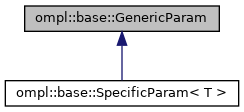Motion planning algorithms often employ parameters to guide their exploration process. (e.g., goal biasing). Motion planners (and some of their components) use this class to declare what the parameters are, in a generic way, so that they can be set externally. More...
#include <ompl/base/GenericParam.h>

Public Member Functions | |
| GenericParam (std::string name) | |
| The constructor of a parameter takes the name of the parameter (name) | |
| const std::string & | getName () const |
| Get the name of the parameter. | |
| void | setName (const std::string &name) |
| Set the name of the parameter. | |
| virtual bool | setValue (const std::string &value)=0 |
| Set the value of the parameter. The value is taken in as a string, but converted to the type of that parameter. | |
| virtual std::string | getValue () const =0 |
| Retrieve the value of the parameter, as a string. | |
| template<typename T > | |
| GenericParam & | operator= (const T &value) |
| Assignment operator by type. This is just for convenience, as it just calls setValue() | |
| void | setRangeSuggestion (const std::string &rangeSuggestion) |
| Set a suggested range. | |
| const std::string & | getRangeSuggestion () const |
| Get the suggested range of values. | |
Protected Attributes | |
| std::string | name_ |
| The name of the parameter. | |
| std::string | rangeSuggestion_ |
| Suggested range for the parameter. More... | |
Detailed Description
Motion planning algorithms often employ parameters to guide their exploration process. (e.g., goal biasing). Motion planners (and some of their components) use this class to declare what the parameters are, in a generic way, so that they can be set externally.
Definition at line 129 of file GenericParam.h.
Member Data Documentation
◆ rangeSuggestion_
|
protected |
Suggested range for the parameter.
This can be used to provide a hint to, e.g., a GUI. The convention used in OMPL is to denote ranges for the following types as follows:
bool:"0,1"enum:"<enum_val0>,<enum_val1>,<enum_val2>,..."int,double:either "first:last" or "first:stepsize:last". In the first case, the stepsize is assumed to be 1. It is important to use floating point representations for double ranges (i.e., "1." instead of "1") to make sure the type is deduced correctly.
Definition at line 227 of file GenericParam.h.
The documentation for this class was generated from the following file:
- ompl/base/GenericParam.h